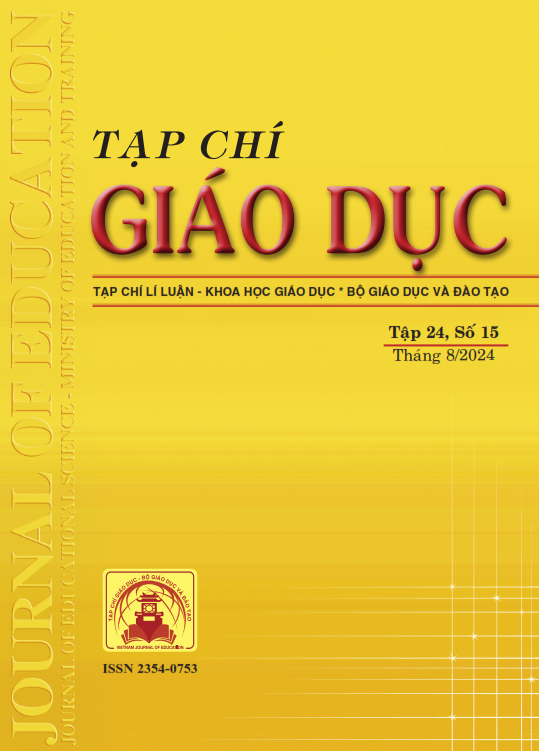Mối liên hệ giữa buông xả (Non-attachment) và hạnh phúc tâm lí của người trưởng thành trẻ tuổi
Tóm tắt
Nowadays, certain theories with spiritual origins from Buddhism have been applied in supporting mental healthcare and improving human well-being, among which non-attachment is one such application. This paper presents the results of a study on the relationship between non-attachment and the psychological well-being of young adults. The study employs a cross-sectional quantitative research method using questionnaires combined with in-depth interviews with a convenient sample of 660 young adults, including 5 in-depth interview subjects. The research results show a moderate positive correlation between non-attachment and the psychological well-being of young adults. Specifically, non-attachment has a positive correlation with all 6 dimensions of psychological well-being, and it can partially influence the variability of psychological well-being and its dimensions in young adults.
Tài liệu tham khảo
Đặng Hoàng Ngân (2018). Một số vấn đề về đánh giá cảm nhận hạnh phúc trong nghiên cứu tâm lí. Kỉ yếu Hội nghị khoa học cán bộ trẻ và học viên sau đại học năm 2017: “Khoa học xã hội và nhân văn Việt Nam trong quá trình toàn cầu hóa”. NXB Đại học Quốc gia Hà Nội, tr 288-302.
Elphinstone, B., Whitehead, R., & Bates, G. (2020). “Letting go” and flourishing in study: An investigation of the indirect relationship between nonattachment and grades via psychological wellbeing. Learning and Individual Differences, 78, 101847.
Grabovac, A. D., Lau, M. A., & Willett, B. R. (2011). Mechanisms of mindfulness: A Buddhist psychological model. Mindfulness, 2, 154-166.
Hang, N. T. M., & Ngan, D. H. (2017). Buddhist Non-Attachment Philosophy and Psychological Well-Being in Vietnamese Buddhists. European Proceedings of Social and Behavioural Sciences.
Hồ Khai Tâm (2022). Mối liên hệ giữa buông xả (non-attachment) và hạnh phúc tâm lí của người trưởng thành trẻ tuổi. Luận văn thạc sĩ Tâm lí học, Trường Đại học Sư phạm Thành phố Hồ Chí Minh.
Ju, S. J., & Lee, W. K. (2015). Mindfulness, non-attachment, and emotional well-being in Korean adults. Advanced Science and Technology Letters, 87, 68-72. https://doi.org/10.14257/astl.2015.87.15
Kiều Thị Thanh Trà (2018). Psychological well-being of student in Ho Chi Minh City. Kỉ yếu hội thảo khoa học quốc tế tâm lí học học đường lần thứ 6. NXB Đại học Sư phạm, tr 93-99.
Nguyễn Lân (2000). Từ điển Từ và Ngữ Việt Nam. NXB Tổng hợp Thành phố Hồ Chí Minh.
Nguyễn Trâm Anh (2016). Ảnh hưởng của buông xả đến cảm nhận hạnh phúc tâm lí của tín đồ Phật giáo. Khóa luận tốt nghiệp Tâm lí học, Trường Đại học Khoa học và Xã hội nhân văn - Đại học Quốc gia Hà Nội.
Ryff, C. D. (1989). Happiness is everything, or is it? Explorations on the meaning of psychological well-being. Journal of Personality and Social Psychology, 57(6), 1069-1081.
Ryff, C. D., & Keyes, C. L. M. (1995). The structure of psychological well-being revisited. Journal of Personality and Social Psychology, 69(4), 719-727.
Sahdra, B. K., Shaver, P. R., & Brown, K. W. (2010). A scale to measure nonattachment: A Buddhist complement to Western research on attachment and adaptive functioning. Journal of Personality Assessment, 92(2), 116-127.
Siah, P. C., Tun, P., & Chan, M. (2020). Non-attachment and happiness: mediating versus moderating roles of grit personality. Current Issues in Personality Psychology, 8(1), 31-40.
Wallace, B. A., & Shapiro, S. L. (2006). Mental balance and well-being: building bridges between Buddhism and Western psychology. American Psychologist, 61(7), 690-701. https://doi.org/10.1037/0003-066X.61.7.690
Wang, S. Y., Wong, Y. J., & Yeh, K. H. (2016). Relationship harmony, dialectical coping, and nonattachment: Chinese indigenous well-being and mental health. The Counseling Psychologist, 44(1), 78-108.
Whitehead, R., Bates, G., Elphinstone, B., & Yang, Y. (2021). The relative benefits of nonattachment to self and self‐compassion for psychological distress and psychological well‐being for those with and without symptoms of depression. Psychology and Psychotherapy: Theory, Research and Practice, 94(3), 573-586.
Whitehead, R., Bates, G., Elphinstone, B., Yang, Y., & Murray, G. (2018). Non-attachment mediates the relationship between mindfulness and psychological wellbeing, subjective well-being, and depression, anxiety and stress. Journal of Happiness Studies, 20, 2141-2158. https://doi.org/10.1007/s10902-018-0041-9
Tải xuống
Đã Xuất bản
Cách trích dẫn
Số
Chuyên mục
Giấy phép

Tác phẩm này được cấp phép theo Ghi nhận tác giả của Creative Commons Giấy phép quốc tế 4.0 .












